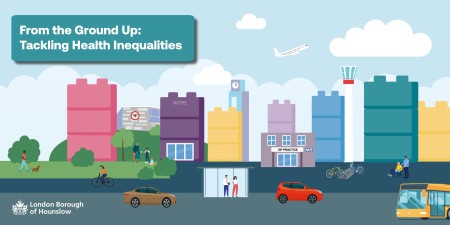The Council’s Annual Public Health Report, called From the Ground Up: Tackling Health Inequalities, focuses on people who face health inequalities in Hounslow. It explains how the Public Health team and Hounslow Borough Based Partnership (BBP) are working to reduce health inequalities using the NHS England CORE20PLUS5 framework.

Hounslow Council will publish its Annual Public Health Report for 2023/24 on Wednesday, 12 March. It explores the Council’s Public Health team and the BBP’s work to identify the groups in Hounslow who are experiencing health inequalities and how it’s working to help them.
Health inequalities happen when people in certain communities and demographics face poorer health outcomes than others, such as lower life expectancy, higher obesity levels, and worse mental health. The report digs into why this is, the fact that it’s not inevitable, and what can be done to tackle it.
Pioneering work
Hounslow Council is the first organisation in the country to use the NHS England CORE20PLUS5 framework to conduct a project at this scale. It hopes to inspire others to launch their own projects to tackle health inequalities, using this report as a guide. The Public Health team is also offering local Train the Trainer sessions to help staff across the local health system to utilise the findings to inform projects within their organisations.
Identifying inequalities and need
The BBP led on the work to identify people in Hounslow experiencing health inequalities using the CORE20PLUS framework. It found that there 25,199 residents in Hounslow living in CORE20 areas (the 20% of the population facing the greatest deprivation). It also identified three PLUS groups (groups among whom action is needed to improve health outcomes). In Hounslow they are young carers, the homeless community, and asylum seekers.
The challenges these groups face include higher smoking rates, less access to local health services (including higher travelling times to services), higher rates of depression and anxiety, and lower rates of vaccination.
The work presented in the report shows that it is possible to reduce the gap in inequalities between CORE20 areas and PLUS groups and the rest of Hounslow. There are examples includes of work that demonstrates this. These include:
- Improving the environment to enable healthier living through healthier advertising through our Local Healthy Advertising Policy, better transport access, and improved food security.
- Administering more roving vaccinations in CORE20 areas through the Health Outreach Team, reducing the gap in vaccination rates with other parts of Hounslow
- Setting up a dedicated falls prevention service (Stay Steady and Active) with events in CORE20 areas
- Promoting Healthy Hounslow’s stop smoking services in CORE20 areas, doubling sign ups in January and February 2025
- Promoting trauma-informed training for asylum seekers
- Increasing awareness of local free health services for those experiencing homelessness
Listening to residents
To inform the work outlined in the report, the Public Health team and BBP spoke to people in the CORE20 and PLUS groups to better understand the reasons for the challenges they face and what could be done to address them.
Residents told them they weren’t always aware of support services that were available, sometimes due to language barriers or information not in formats that were easy to understand. Residents in CORE20 areas also asked for improved access to services that could help them maintain physical and mental health and wellbeing.
The report explains how the Council and its partners in the BBP have since started to address the need they discovered using an approach that covers prioritises equality, diversity, inclusion (EDI), and focuses on prevention and early intervention to tackle health and wellbeing differences.
Councillor Lily Bath, Hounslow Council’s Cabinet Member for Adult Social Care, Public Health and Integration, said: “We don’t have to accept health inequalities as a part of life, as this report shows. It chronicles a pioneering piece of work by the Council and Borough Based Partnership and gives people a working template to replicate it. It shows how much good can be done through effective collaboration and I hope many others take up challenge to reduce health inequalities where they are.”
Kelly O’Neill, Director of Public Health, Hounslow Council, said: “I’m hugely proud of the work our Public Health team and Borough Based Partnership have done to reduce health inequalities in Hounslow. We want people to read this report and be inspired to tackle health inequalities themselves. The main message we want people to take away is that better health outcomes are possible for everybody.
“There’s no reason why some people should face poorer health than others just because of their location or circumstances. It takes a lot of work to fix entrenched issues like this, and we still have a long road ahead, but we’re determined to get there and deliver health equality for all in Hounslow.”